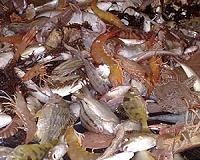 |
Ithaca NY (SPX) Jun 03, 2010 When it comes to potentially doubling the output of the world's fourth largest food crop, the secret may be in the spit. Researchers at Cornell University, as well as the University of Goettingen and National University of Colombia, have discovered that when a major South American pest infests potato tubers, the plant produces bigger spuds. The secret to this increased yield, they write in the peer-reviewed journal Ecological Applications (April 28, 2010), is found that the saliva of the Guatemalan potato moth larvae (Tecia solanivora). The major pest, which forces many farmers to spray plants with pesticides every two weeks, contains compounds in its foregut that elicits a system-wide response in the Colombian Andes commercial potato plant (Solanum tuberosum) to produce larger tubers. The researchers found that when the spit of the tuber moth caterpillar gets into a tuber, all the other tubers of the plant grow bigger, said co-author Andre Kessler, Cornell assistant professor of ecology and evolutionary biology. Researchers believe that compounds from the insect's saliva somehow increases the rate of the plant's photosynthesis to compensate for the tubers lost to the caterpillar damage. As a result of more photosynthesis, more carbon is drawn into the plant and used to create starch, which makes for bigger tubers. Plants have a number of responses to insects and other animals that eat them, including changing metabolism or producing toxins, said Kessler. In turn, the herbivores may develop strategies to counter the plant's defenses and influence its signaling pathways. "This could be an example where the co-evolutionary arms race led to a beneficial outcome for both," said Kessler. Another key seems to be getting the right mix of potato and pest. When the larvae infested fewer than 10 percent of the tubers, the plant produced marketable yields (after infested tubers were removed) that weighed 2.5 times more than undamaged plants, according to the study. When up to 20 percent of the potatoes were damaged, marketable yields still doubled. When as many as half of the potatoes were infested, yields equaled those of plants with no infestation. The findings have implications for potato farmers. Once isolated, the compound could lead to considerably higher yields in some varieties. Initially, researchers wanted to show how these pests reduced potato yields, but they actually they found yield increases, said Katja Poveda, the study's principal investigator, at the Agroecology Institute of the University of Goettingen, Germany, and the Cornell entomology department. "The moth eats all varieties of potatoes, but so far only this one variety responded" with increased yields among seven varieties that were tested as part of a larger project", said Poveda. "Future experiments will test more commercial varieties, as well as wild potatoes", she added.
Share This Article With Planet Earth
Related Links Cornell University Farming Today - Suppliers and Technology
 Canada supermarkets curb 'destructively fished' seafood
Canada supermarkets curb 'destructively fished' seafoodOttawa (AFP) June 2, 2010 Canada's major supermarket chains won unusual praise from Greenpeace on Wednesday for starting to rid their shelves of "destructively fished or farmed" seafood. In a report, Greenpeace ranked eight major grocery chains on their efforts to help improve the sustainability of the seafood they buy and sell. It said that "following pressure by environmental organizations and the public," reta ... read more |
|
| The content herein, unless otherwise known to be public domain, are Copyright 1995-2010 - SpaceDaily. AFP and UPI Wire Stories are copyright Agence France-Presse and United Press International. ESA Portal Reports are copyright European Space Agency. All NASA sourced material is public domain. Additional copyrights may apply in whole or part to other bona fide parties. Advertising does not imply endorsement,agreement or approval of any opinions, statements or information provided by SpaceDaily on any Web page published or hosted by SpaceDaily. Privacy Statement |